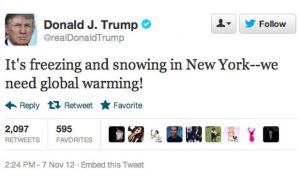
 Ever since Donald Trump entered the GOP presidential primary back in the summer of 2015, political leaders in both parties and the media have debated his use of Twitter to spread his message. Trump’s enormous Twitter following, garnered due to his celebrity, certainly aided his rise to power – of that there is no debate – but has also led to some of his most controversial moments. Political commentators tend to gravitate toward one of two extremes: that Trump should stop using social media altogether as Commander-In-Chief, or that he should continue to use Twitter and social media as president in the same manner as during the campaign. I believe that either extreme is a bad option.
Ever since Donald Trump entered the GOP presidential primary back in the summer of 2015, political leaders in both parties and the media have debated his use of Twitter to spread his message. Trump’s enormous Twitter following, garnered due to his celebrity, certainly aided his rise to power – of that there is no debate – but has also led to some of his most controversial moments. Political commentators tend to gravitate toward one of two extremes: that Trump should stop using social media altogether as Commander-In-Chief, or that he should continue to use Twitter and social media as president in the same manner as during the campaign. I believe that either extreme is a bad option.
President Trump can use social media to his political advantage the way Ronald Reagan used the radio, if he does it right. Reagan constantly frustrated the liberal media by going around them to communicate directly to the American public. If Reagan wanted to point-out the bias in news reporting, or communicate his position on a policy matter, he would take to the airwaves and make his case directly to American voters. In fact, it is not a stretch to say that Reagan’s use of radio in the years between his governorship of California and his entry into the 1980 presidential campaign propelled him to the highest office in the land. By using the radio, Reagan was able to connect on a personal level with the public, unfiltered by the liberal media and their bias.
Donald Trump has the opportunity to do the same thing with Twitter and social media if he does it wisely. Trump can go over the heads of political commentators and network news by tweeting out his own thoughts on current events and policy affairs, much as Ronald Reagan did in the 1980s. As was demonstrated during the 2016 presidential primaries and general election, this certainly is a successful strategy. Giving up social media altogether would undermine Donald Trump’s appeal to middle-American voters who propelled him to the presidency over Hillary Clinton. It would undercut his success in the White House.
While Trump shouldn’t give-up social media while in office, he should put checks and balances on his own tweets. Those 140 character statements, as president, will have international implications. While Senator Marco Rubio was criticized during the GOP primaries for saying that “The problem is presidents can’t just say what they want,” a truer statement has never been made. The entire country, nay the world, listens to what the American President has to say. Domestic policies and foreign affairs are affected by presidential communicates, whether delivered at the White House lectern or from a handheld device.
One notable example of a near-international incident over a president’s quick wit took place in 1984 when Ronald Reagan was doing a sound check for one of those famous radio addresses. While sitting in the studio before going on-air Reagan joked with the sound technician saying “My fellow Americans, I’m pleased to tell you today that I’ve signed legislation that will outlaw Russia forever. We begin bombing in five minutes.” The clip was later leaked to the press and led to the Soviet Union denouncing the act as provocative and threatening to escalate their defense readiness position. Reagan never intended the parody of his opening line to go public, and yet it still caused an international uproar.
I believe that President Trump should continue to use Twitter and other social media platforms to communicate his message directly to the American people, but that he should work with his newly-appointed communications team to ensure that the 140 character communications are well-planned and carefully sent out into cyberspace. After January 20th, Donald Trump’s tweets will no longer be merely entertaining; they will carry with them the weight of the most powerful office on the planet.




